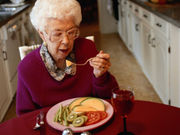Seniors with unsatisfactory chewing ability, poor diet use fewer annual preventive care, dental services
WEDNESDAY, June 29, 2016 (HealthDay News) — For older adults, unsatisfactory chewing ability and poor diet are associated with longer hospital stays, according to a study published in the June issue of the Journal of the American Geriatrics Society.
Yuan-Ting C. Lo, Ph.D., M.P.H., from the National Defense Medical Center in Taipei, Taiwan, and colleagues examined whether chewing ability affects health care use and expenditures in elderly individuals (aged 65 years and older). Data on annual medical use and expenditures were included for 1,793 individuals. Questionnaires were used to assess chewing ability and dietary quality.
The researchers found that older adults with unsatisfactory chewing ability had substantially higher use of emergency services, hospitalization, and total medical expenditures after eight years of follow-up. Compared with those with satisfactory chewing ability, older adults with unsatisfactory chewing ability and a poor diet used fewer annual preventive care and dental services and had longer hospital stays and higher expenditures. Unsatisfactory chewing ability resulted in significantly longer hospital stays among those with a poor diet after adjustment for covariates.
“Unsatisfactory chewing ability and a less-diverse diet together are associated with longer hospital stays and higher medical expenditures,” the authors write.
Copyright © 2016 HealthDay. All rights reserved.








